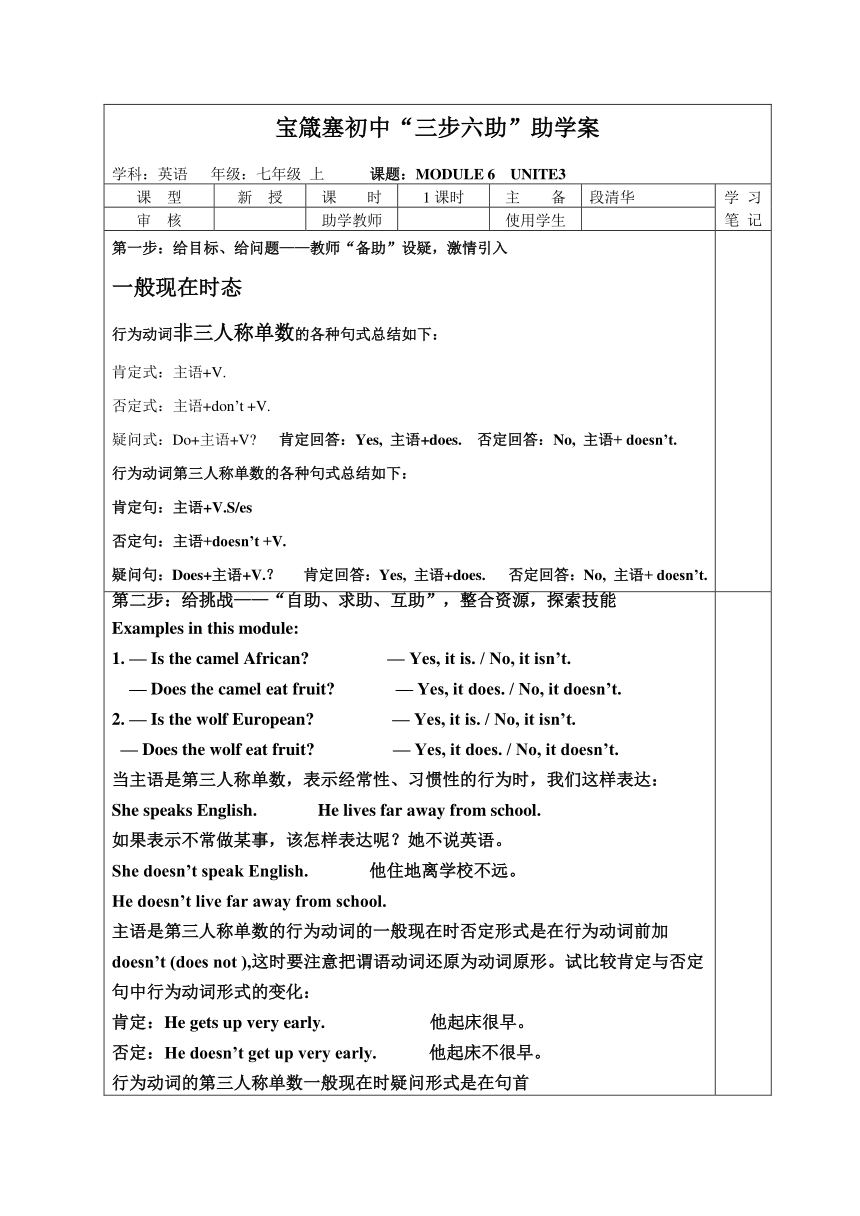外研版(2012新版)>>七年级上>Module 6 A trip to the zoo>Unit 3 Language in use.学案
文档属性
| 名称 | 外研版(2012新版)>>七年级上>Module 6 A trip to the zoo>Unit 3 Language in use.学案 |

|
|
| 格式 | zip | ||
| 文件大小 | 13.3KB | ||
| 资源类型 | 教案 | ||
| 版本资源 | 外研版 | ||
| 科目 | 英语 | ||
| 更新时间 | 2012-12-14 00:00:00 | ||
图片预览

文档简介
宝箴塞初中“三步六助”助学案
学科:英语 年级:七年级 上 课题:MODULE 6 UNITE3
课 型
新 授
课 时
1课时
主 备
段清华
学 习 笔 记
审 核
助学教师
使用学生
第一步:给目标、给问题——教师“备助”设疑,激情引入
一般现在时态
行为动词非三人称单数的各种句式总结如下:
肯定式:主语+V. 否定式:主语+don’t +V. 疑问式:Do+主语+V? 肯定回答:Yes, 主语+does. 否定回答:No, 主语+ doesn’t.
行为动词第三人称单数的各种句式总结如下:
肯定句:主语+V.S/es
否定句:主语+doesn’t +V.
疑问句:Does+主语+V.? 肯定回答:Yes, 主语+does. 否定回答:No, 主语+ doesn’t.
第二步:给挑战——“自助、求助、互助”,整合资源,探索技能
Examples in this module:
1. — Is the camel African? — Yes, it is. / No, it isn’t.
— Does the camel eat fruit? — Yes, it does. / No, it doesn’t.
2. — Is the wolf European? — Yes, it is. / No, it isn’t.
— Does the wolf eat fruit? — Yes, it does. / No, it doesn’t.
当主语是第三人称单数,表示经常性、习惯性的行为时,我们这样表达:
She speaks English. He lives far away from school.
如果表示不常做某事,该怎样表达呢?她不说英语。
She doesn’t speak English. 他住地离学校不远。
He doesn’t live far away from school.
主语是第三人称单数的行为动词的一般现在时否定形式是在行为动词前加
doesn’t (does not ),这时要注意把谓语动词还原为动词原形。试比较肯定与否定
句中行为动词形式的变化:
肯定:He gets up very early. 他起床很早。
否定:He doesn’t get up very early. 他起床不很早。
行为动词的第三人称单数一般现在时疑问形式是在句首
加助动词does ,而加does之后,后面的谓语动词像否定句一样也要用原形。
试比较:
肯定:He gets up very early. 他起床很早。
疑问:Does he get up very early? 他起床很早吗?
第三步:给点评、总结——教师“补助”点评、总结,提升知识与情感。学生“再助”查漏补缺,复习巩固
一、 用括号内所给动词的适当形式填空。
1. The monkey _____ (like) bananas.
2. Lucy ___________ (not visit) Japan.
3. ____ Tiger ____ (live) in the wild in China?
4. The worker _____ (give) the lion ten kilos of meat a day.
5. Where ____ the wolf _____ (come) from?
二、 句型转换。
1. My favourite animal is the elephant.
(对划线部分提问)
_____ _ your favourite animal?
2. Hand often goes to see his grandparents
on Saturdays.
(改为一般疑问句,并作否定回答)
____ Hand often __ to see his
grandparents on Saturdays?
No, he _______.
3. Our school has two thousand students.
(改为同义句)
_____ ___ two thousand students in
our school.
4. The panda is from China.
(改为同义句)
The panda ______ _____ China.
5. The tiger eats 5 kilos of meat a day.
(对划线部分提问)
____ _____ meat does the tiger eat a day?
学科:英语 年级:七年级 上 课题:MODULE 6 UNITE3
课 型
新 授
课 时
1课时
主 备
段清华
学 习 笔 记
审 核
助学教师
使用学生
第一步:给目标、给问题——教师“备助”设疑,激情引入
一般现在时态
行为动词非三人称单数的各种句式总结如下:
肯定式:主语+V. 否定式:主语+don’t +V. 疑问式:Do+主语+V? 肯定回答:Yes, 主语+does. 否定回答:No, 主语+ doesn’t.
行为动词第三人称单数的各种句式总结如下:
肯定句:主语+V.S/es
否定句:主语+doesn’t +V.
疑问句:Does+主语+V.? 肯定回答:Yes, 主语+does. 否定回答:No, 主语+ doesn’t.
第二步:给挑战——“自助、求助、互助”,整合资源,探索技能
Examples in this module:
1. — Is the camel African? — Yes, it is. / No, it isn’t.
— Does the camel eat fruit? — Yes, it does. / No, it doesn’t.
2. — Is the wolf European? — Yes, it is. / No, it isn’t.
— Does the wolf eat fruit? — Yes, it does. / No, it doesn’t.
当主语是第三人称单数,表示经常性、习惯性的行为时,我们这样表达:
She speaks English. He lives far away from school.
如果表示不常做某事,该怎样表达呢?她不说英语。
She doesn’t speak English. 他住地离学校不远。
He doesn’t live far away from school.
主语是第三人称单数的行为动词的一般现在时否定形式是在行为动词前加
doesn’t (does not ),这时要注意把谓语动词还原为动词原形。试比较肯定与否定
句中行为动词形式的变化:
肯定:He gets up very early. 他起床很早。
否定:He doesn’t get up very early. 他起床不很早。
行为动词的第三人称单数一般现在时疑问形式是在句首
加助动词does ,而加does之后,后面的谓语动词像否定句一样也要用原形。
试比较:
肯定:He gets up very early. 他起床很早。
疑问:Does he get up very early? 他起床很早吗?
第三步:给点评、总结——教师“补助”点评、总结,提升知识与情感。学生“再助”查漏补缺,复习巩固
一、 用括号内所给动词的适当形式填空。
1. The monkey _____ (like) bananas.
2. Lucy ___________ (not visit) Japan.
3. ____ Tiger ____ (live) in the wild in China?
4. The worker _____ (give) the lion ten kilos of meat a day.
5. Where ____ the wolf _____ (come) from?
二、 句型转换。
1. My favourite animal is the elephant.
(对划线部分提问)
_____ _ your favourite animal?
2. Hand often goes to see his grandparents
on Saturdays.
(改为一般疑问句,并作否定回答)
____ Hand often __ to see his
grandparents on Saturdays?
No, he _______.
3. Our school has two thousand students.
(改为同义句)
_____ ___ two thousand students in
our school.
4. The panda is from China.
(改为同义句)
The panda ______ _____ China.
5. The tiger eats 5 kilos of meat a day.
(对划线部分提问)
____ _____ meat does the tiger eat a day?
同课章节目录
- Starte
- Module 1 My teacher and my friends
- Module 2 My English lesson
- Module 3 My English book
- Module 4 My everyday life
- Module 1 My classmates
- Unit 1 Nice to meet you.
- Unit 2 I'm Wang Lingling and I'm thirteen years ol
- Unit 3 Language in use.
- Module 2 My family
- Unit 1 Is this your mum?
- Unit 2 These are my parents.
- Unit 3 Language in use.
- Module 3 My school
- Unit 1 There are thirty students in my class.
- Unit 2 The library is on the left of the playgroun
- Unit 3 Language in use.
- Module 4 Healthy food
- Unit 1 We've got lots of apples.
- Unit 2 Is your food and drink healthy?
- Unit 3 Language in use.
- Module 5 My school day
- Unit 1 I love history.
- Unit 2 We start work at nine o'clock.
- Unit 3 Language in use.
- Revision module A
- Module 6 A trip to the zoo
- Unit 1 Does it eat meat?
- Unit 2 The tiger lives in Asia.
- Unit 3 Language in use.
- Module 7 Computers
- Unit 1 How do I write my homework on the computer?
- Unit 2 When do you use a computer?
- Unit 3 Language in use.
- Module 8 Choosing presents
- Unit 1 I always like birthday parties.
- Unit 2 She often goes to concerts.
- Unit 3 Language in use.
- Module 9 People and places
- Unit 1 We're enjoying the school trip a lot.
- Unit 2 They're waiting for buses or trains.
- Unit 3 Language in use.
- Module 10 Spring Festival
- Unit 1 Are you getting ready for Spring Festival?
- Unit 2 My mother's cleaning our houses and sweepin
- Unit 3 Language in use.
- Revision module B
